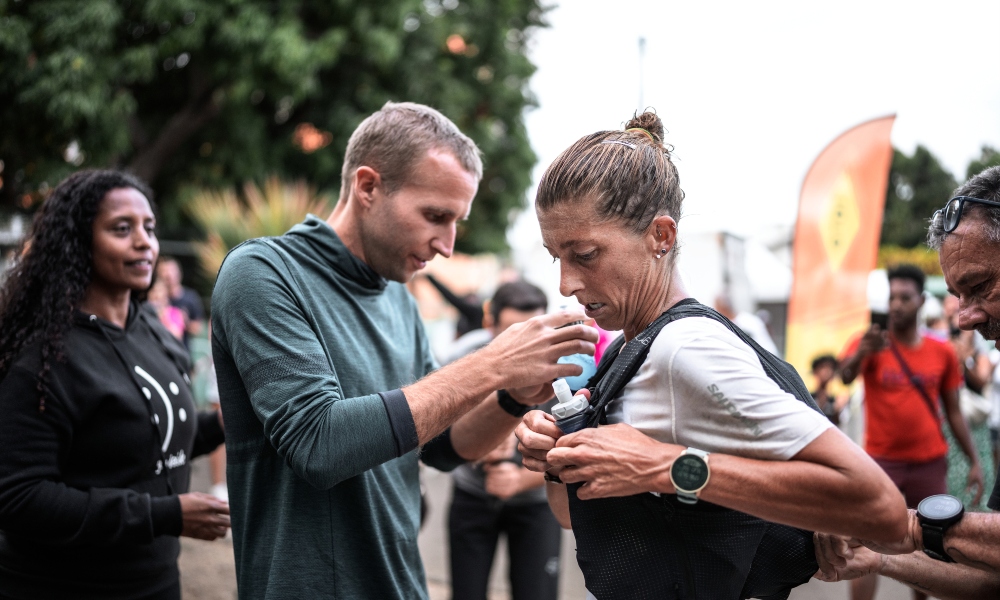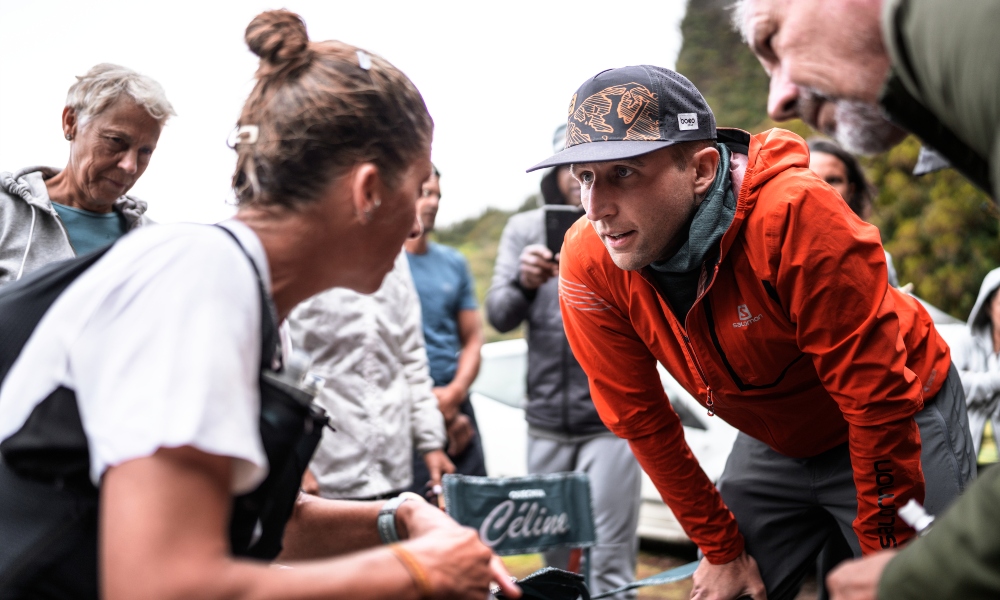Unconditional love. That’s what we all want on Valentine’s Day and every other day of the year. To be loved thoroughly even if we’re far from perfect. Or a bit of a mess. Or falling apart physically and psychologically during an ultra marathon we’re having serious regrets about entering. Those are the moments you need someone there you can really lean on, even lose it in front of and not worry about them walking away from you forever. Inviting someone to be your support person isn’t great for a first date. You need someone you know you can count on in the trenches.
That’s exactly what Kevin Schmidt is for decorated ultra running champion Courtney Dauwalter. He’s her pillar out there. No matter how wild things get, she knows he’s got her back. And that allows her to run hard, to push herself. She’s not out there alone, but held by a loving support system.
Courtney and Kevin are currently preparing for the Trans Gran Canaria coming at the end of February. We caught up with the couple and talked to them about the support person role and what it takes. Read on to get the goodness.

Courtney’s insights
How does Kevin make racing easier for you?
How doesn’t Kevin make racing easier for me?! He is a huge part of the team and I am so thankful that he loves this sport just as much as I do. Before races I can always count on Kevin to help me think through some of the race logistics and we talk through all the aid stations. During the race, he is incredibly organized and efficient, he is calm no matter what is happening, and he knows what to say to give me a boost (usually it’s a bad joke).
What do you see as the essential skills a support person needs to have?
It’s important that they like it! Knowing that Kevin is having a blast spending his day crewing me at a race makes me smile while I’m out on course. I think it’s also important that a support person is ready to help you get to that finish line no matter what. There is always another solution to try, another way to encourage, another type of food to offer. The finish line is something achieved by the entire team, so it’s important for a support person to be positive and prepared to solve all types of problems on the way towards that finish line.
Does having your partner as your support person make it easier?
It is probably different for different couples. For Kevin and I, yes it makes it easier. Doing this sport together allows us to share so many moments that we will hold onto forever and will smile about when we’re 90 years old. It also helps because we know each other very well, so in the toughest moments we know how to help each other.
Kevin’s insights
What do you enjoy about supporting your partner on these big days?
Crewing for a big race or adventure is a cool shared experience between Court and I. She’s out there pushing herself and doing what she loves, and it makes me happy to be able to support her and do my best to help her succeed. I love the preparation before, the problem solving during, and all of the stories we share about our days after. The whole experience is so much fun!
What’s the most challenging thing about it?
The most challenging is seeing her in her darkest moments, knowing the pain she’s working through. It’s hard seeing your partner suffer, but I know how much she loves these challenges so I’ve learned to embrace it and help out as best I can.
What do you see as your role as a support person?
If I’m well prepared, Court can be confident that all of the food and gear she needs will be ready at the next aid location and she can just focus on getting there. I think it’s also important to have good energy, be ready with questionable jokes, and to be a teammate in problem-solving with anything that comes up during the race.
What are the key jobs a good support person must do well? Both the practical side, food etc, and also the mental side, encouragement etc?
Being fully organized before the race is the most important thing for me. During an event it can feel crazy sometimes, and having a clear plan to work from helps reduce mistakes at aid stations. Knowing what might go wrong and preparing a variety of gear, food, or jokes to help your runner is also highly recommended.
How do you train or prepare for the big day? What sort of work is involved?
I do a lot of research on the course we’re going to, both the running course and the crewing course. It’s helpful to have rough splits for the runner so you know when to expect them at aid stations, but also to know how long it takes to drive there, where to park, if you need to hike in, etc.
Running training can also be helpful in case, hypothetically, you blow tires on two different vehicles en route to an aid station and need to run a little yourself. This happened at the Moab 240 in 2017! I ran two miles into the aid station with armfuls of gear after both our crew vehicles got flat tires. Court was almost to the aid station so I took off running while our other crew person fixed the tires.
Do you have any little secrets or tips you’d like to share with others in terms of ways to succeed as a support person?
Know your runner, and what will help them when they hit a low patch. Do they need tough love or dad jokes? Pancakes or pizza? And always always, have their favorite beverage ready at that finish line.
All images by Jordi Saragossa.
